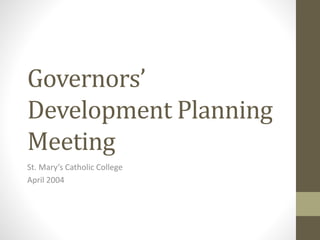Governors development planning meeting - April 2004
- 1. GovernorsŌĆÖ Development Planning Meeting St. MaryŌĆÖs Catholic College April 2004
- 2. Mission Statement St. MaryŌĆÖs Catholic High School is a caring faith community. Our mission is to provide an outstanding whole-person education through which all are challenged to grow in wisdom, understanding, self-esteem and closeness to God.
- 3. SessionŌĆÖs Objectives ŌĆó To inform governors of some of the main strategic issues affecting the school ŌĆó To identify additional strategic issues affecting the school ŌĆó To identify new objectives that can be considered for inclusion in the SDP 2004-07
- 4. Megatrends ŌĆó Exponential ICT development ŌĆó Globalisation ŌĆó Social fragmentation (at a micro and macro level) ŌĆó Increasing Accountability ŌĆó Informed Professional Judgement (post-informed central prescription) ŌĆó Difficulties in recruiting/retaining high calibre staff ŌĆó Declining Church attendance (a lack of belonging but no less believing?)
- 6. OECD Trends ŌĆó Extended Adolescence ŌĆó Increasing time in front-end loaded education ŌĆó Entering labour market later ŌĆó Delaying family responsibilities ŌĆó The Knowledge Economy ŌĆó Know what, know why, know how, know who ŌĆó Schooling deals in know what
- 7. OECD Trends ŌĆó Inequality and Exclusion ŌĆó Reductions in wealth and income inequalities in 20th Century now reversed ŌĆó Impact on young and unskilled ŌĆó Link between education outcomes and poverty ŌĆó Changing Family & Community Life ŌĆó Individualism and social fragmentation ŌĆó Decline of the conventional family
- 8. Future School Scenarios ŌĆóExtending the Market Model ŌĆóDe-schooling ŌĆóRe-schooling
- 9. Extending the Market Model ŌĆó Extended Market Model ŌĆó Learning bought and sold by a wide variety of organisations ŌĆó Greater privatisation of education ŌĆó Specialist Schools & vouchers
- 10. De-Schooling ŌĆó Learning Networks and Network Society ŌĆó Dissatisfaction with institutions ŌĆó Virtual Schools ŌĆó 14-19 Review ŌĆó Meltdown Scenario ŌĆó Fuelled by Teacher Exodus ŌĆó Impact on student learning ŌĆó Varies geographically and by subject
- 11. Re-schooling ŌĆó Schools as Core Social (Spiritual) Centres ŌĆó Schools seek to counteract effect of social fragmentation ŌĆó Personal, social and community outcomes ŌĆó Extended Schools ŌĆó (Belonging before believing) ŌĆó (Impact on parishes)
- 12. Re-Schooling ŌĆó Schools as Focused Learning Organisations ŌĆó Focus on cognitive outcomes ŌĆó Linked to knowledge economy ŌĆó Focus on quality and equality of opportunity ŌĆó Learning Organisations ŌĆō focus on CPD, R&D and extensive networking ŌĆó Workforce agreement
- 13. Current and Future Roles for Schooling ŌĆó Custody ŌĆó Cognitive Development ŌĆó Behavioural rules ŌĆō rules & routines ŌĆó Socialisation ŌĆō values & dispositions ŌĆó Screening and Sorting
- 14. Current Strategic Influences ŌĆó 14-19 Curriculum & Qualification Reforms ŌĆó Every Child Matters ŌĆó Building Schools for the Future ŌĆó Deanery/Diocesan Reviews
- 15. The Session Ahead ŌĆó Identify any strategic influences that have been missed ŌĆó Find the GAPS between our vision and the College Development Plan ŌĆó Identify new objectives ŌĆó Prioritise new objectives you have identified















